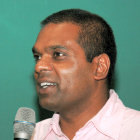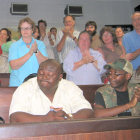By: Sharon Davis
Send to a friend
The details you provide on this page will not be used to send unsolicited email, and will not be sold to a 3rd party. See privacy policy.
Is a South African row over academic freedom rooted in objections to post-apartheid reforms or to abrasive management, asks Sharon Davis.
Clashes between academics and senior management at South Africa’s University of KwaZulu-Natal (UKZN) have highlighted the difficulties for institutions facing the country’s changing political and social circumstances.
Over a thousand people, including respected South African and international academics, have signed an online petition supporting two professors who were suspended after criticising the university’s management for suppressing academic freedom.
The university, meanwhile, says it has merely disciplined its staff for ignoring procedures and breaching confidentiality.
The dispute has become so acrimonious and public that education minister Naledi Pandor last week called on the university’s council to restore internal and public confidence in the institution.
The root causes of the dispute are complex. Beneath the ostensible complaint about academic freedom are other issues that have been drowned in the emotional response. "The problem at UKZN is much more complicated than people actually see in the media," says Simon Mapadimeng, an industrial sociologist and formerly an academic at the university.
Academic rights
Technically the debate surrounds an action by the vice chancellor and principal of UKZN, Malegapuru Makgoba.

Nithaya Chetty
Sharon Davis
Two academics — mathematics professor John van den Berg and physics professor Nithaya Chetty — have accused Makgoba of repeatedly preventing the discussion in senate of an official science faculty document on academic freedom.
In the document, academics complain that the university suppresses their dissent by racialising and personalising debates.
Makgoba insists that the senate did consider the document in August, as part of a broader document on academic freedom at the university.
Chetty and Van den Berg, though, believing their views were stifled, spoke to the media. The result was suspension for them both. Chetty has subsequently resigned. Van den Berg has been reinstated after signing an acknowledgement of partial guilt that places a final warning on his record.
South Africa’s Freedom of Expression Institute has taken up their cause, linking the dispute with other concerns about compromised academic freedom elsewhere in South Africa.
Jane Duncan, executive director of the institute, says that academic freedom is eroding away in South Africa. One reason for this, she says, is that reduced state funding has placed increasing pressure on universities to find private donors. This is making them more conscious of their brand image and more sensitive to criticism. Makgoba rejects this claim.
Smoke screen?



Chetty receives a standing ovation
Sharon Davis
Chetty voiced his views on academic freedom to a standing ovation at a meeting on freedom of expression and the responsibility of the intellectual, held by the Centre for Civil Society on the UKZN campus last week.
Academic freedom involves not just scholarly freedom but also institutional autonomy and academic rule — a concept relating to the decision-making powers of academics as professional groups — he says. He believes academic rule has been compromised at UKZN. He also claims that the UKZN senate, of which he has been a member, exhibits poor governance and is manipulated in an undemocratic way.
Makgoba says that talk of academic freedom is just a smoke screen — it is an emotional and cherished issue that has led academics to suspend their critical judgement.
He points out that basic academic rights to teach, conduct research, or publish papers remain unchanged at UKZN.
The issue, he says, is an administrative one. The two academics flouted university procedures and breached confidentiality by talking to the media. He had no option but to take disciplinary action against them for bringing the university into disrepute.
But supporters of Makgoba among the staff say the issue is neither one of academic freedom nor administration. It is reluctance by established staff — the ‘old guard’ — to accept change.
‘Transformation’ is the process of altering the demographics created under the white-dominated and oriented apartheid system, to one better representing the overall population.
Within universities this has meant replacing a large number of white and Indian academics and support staff with blacks, not only to address previously enforced inequalities based on race or colour, but also to provide relevant role models for African students.
Universities are also trying to bridge the gap between their own communities and the general public, in order to make academic work more relevant within both South Africa and the wider continent. Resistance to this, says Makgoba, often takes the form of protests about the lowering of academic standards.
There is plenty to admire about transformation at UKZN, according to Mac Mia, chair of the university council. UKZN has managed to establish "a college model … a strong African identity in scholarship, significant state-of-the-art teaching and research infrastructure development … an innovative model of student governance that is being copied by other institutions and has generated exceptional student leadership … modern, objective and transparent management tools" and other successes.
But there has also been great resistance to change. Some of Makgoba’s supporters have gone as far as to suggest that misinformation has deliberately been disseminated in order to derail post-apartheid transformation.
"The current situation … is a culmination of the mischievous antics of some of my colleagues who jealously want to guard their turfs, retain their status quo and continue to wage an endless campaign against the leadership that was put in place to transform the university, not maintain the status quo," says Colleen Aldous Mycock, a geneticist at the university, in a written statement.
"Trumpeting these [academic freedom and management] issues around the university and beyond (in the news media), a number of individuals have worked assiduously to block meaningful change at UKZN," says Ufo Okeke Uzodike, head of the School of Politics, writing in a personal capacity.
Abrasive management
These issues of transformation, equity and race — not academic freedom — lie at the heart of the row, according to Mapadimeng.
So why, then, has he resigned from the university?
Mapadimeng’s position perhaps highlights the third element of this wrangle: the abrasive and controversial figure of Makgoba.
Makgoba is a South African immunologist who studied at the University of Natal Medical School and later gained a DPhil from the University of Oxford, United Kingdom. In 1995 he became the first black deputy vice chancellor at the University of the Witwatersrand, where he was suspended for allegedly falsifying his CV. He was later reinstated.
Between 1999 and 2002 he headed the South African Medical Research Council, where he won accolades for being one of the few academics prepared to speak out against denials that HIV causes AIDS.
He joined UKZN, under controversial circumstances, to implement an unpopular decision to combine five university campuses, now totaling 4,000 academics and 39,000 students, under one banner. He achieved this despite several staff crises but his management style has left critics with plenty of ammunition.
Mapadimeng, for example, has resigned because he believes that a meaningful transformation has not taken place and that the university is rife with "buddy buddy clubs".
He speaks of a "depressive climate", and a "climate of fear and collapsed collegiality". Others describe Makgoba’s management techniques as belligerent and accuse him of bullying staff. An example they cite is the style of attack that Makgoba launched on Chetty for what he called his poor academic performance. Chetty has now put his recent academic performance in the public domain so, he says, that others can decide on its merits.
At the freedom of expression meeting last week, members of the audience accused Makgoba of turning every debate into a racial issue, ruling by fear, promoting cronies, and personally attacking the characters of people who criticise him.
Chetty accuses Makgoba of forcing change and failing to discuss issues with staff. He does agree that transformation has been problematic but he argues that it is because of the way the process has been handled, rather than the establishment’s resistance to change.
Now, the university council has announced it will establish a committee, with external and internal members, with a wide-ranging remit to investigate academic freedom and how disputes are resolved at the university.
Whether it succeeds in calming the troubles will depend on what has created them. For some, the cause of the current tensions is a reluctance of those who used to wield power to let go. For others, it is the manner in which change is being foisted on staff. Perhaps it is a unique blend of both.













